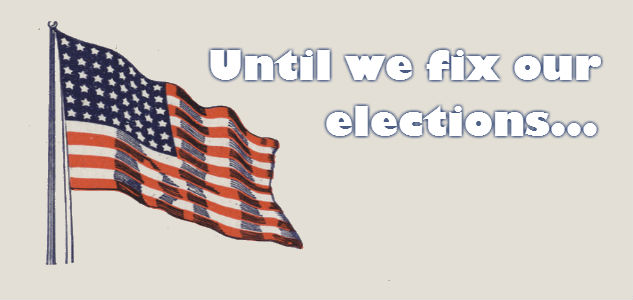
Voting for a third party, whether on the left or the right, is a subject of much discussion during this year’s elections. Both major parties have taken major beatings to their images during the financial crisis and the ensuing economic pain. We are a great country that has had local, state and federal elections every two years since George Washington’s election in 1789. Yet, in modern day, what is that state of our political system? One way to judge this is surely to ask if it makes sense to vote for a non-establishment party. Obviously, with two choices, we have more choices than most cultures have had. But there is no question that the system could use shaking up and a third party could be what is necessary.
Ballot Access News, edited by Richard Winger, had a link to an interesting article by Melinda Henneberger of the Washington Post describing the author’s personal struggle with the decision to vote for a third party. The Ballot Access News post said:
Melinda Henneberger is a political writer for the Washington Post. In this October 20 column, she explores the meaning of voting for a presidential candidate whose ideas may reflect the voter’s own ideas, in the context of a close presidential election. Henneberger gives clues that she actually agrees with Jill Stein, but questions whether it is rational to vote for a candidate who can’t win.
It is maddening that Henneberger cannot bring herself to talk about alternative voting systems, such as proportional representation, instant-runoff voting, or approval voting. Of course proportional representation cannot apply to an office that elects a single winner, and any mention of proportional representation in the context of an election for the nation’s chief executive would also need to explore parliamentary systems.
The Washington Post article concludes with:
Obama has disappointed many environmentalists, but he did get tougher on mercury emissions from power plants, improve fuel-economy standards, reduce the amount of soot that factories can release and regulate greenhouse gases for the first time. Which is not remotely akin to Romney’s periodic expressions of doubt about climate change and view that regulations are job-killing.
Unlike Obama and Romney, Nader and Stein really are samesies. Yet maybe this is a different moment, because where Nader struck me as intellectually dishonest, insisting that Bush and Gore were all but indistinguishable, Stein seems as sensible as cod liver oil. Along with libertarians like Ron and Rand Paul, she’s thinking long-term. In politics as in love, comedy and real estate, nothing is more important than timing — and after Obama expands fracking and green-lights the Keystone Pipeline, she predicts, voters will come around.
Also see our section on the American third party and everything that gets in their way thanks to Democratic and Republican tinkering.
Leave a Reply